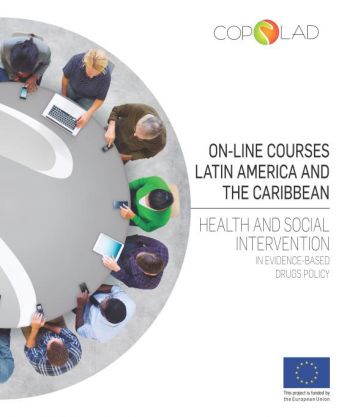National editions
Return
¿Who may benefit?
The courses are available to any interested CELAC country that requests it through its National Drug Agency, or other sectoral institution responsible for public policy on drugs, as well as other institutions recognized by the authorities of each country as agents contributing to the advancement of effective strategies in this fi eld.
Each course is especially aimed at public sector professionals with responsibilities in planning, decision making, management of socio-sanitary services, and other positions in institutions responsible for the implementation of policies at the national, provincial or local level, and it is also addressed to professionals of this sector engaged in the aforementioned institutions.
HOW ARE THE COURSES IMPLEMENTED IN EACH COUNTRY?
- Leadership: The interested country itself leads and carries out the implementation of each course identifying a professional expert to undertake a tutorial role along the implementation of each course.
- Application procedure: The countries and institutions that so wish, may send a formal letter to the Director of COPOLAD, specifying their interest in the course/s selected and, the time frame when —approximately— its implementation is expected, bearing in mind that the duration of each course is six months.
- Free of costs: The adoption of each course is cost-free, both for the country as well as for each participant. All rights of use over the contents are transferred.
COURSES AVAILABLE
1 - USE OF ALCOHOL AND OTHER DRUGS: EVIDENCE-BASED PREVENTION
Provides training on evidence-based preventive strategies for alcohol and other drug use, in order to:
- Increase the effectiveness of preventive interventions.
- Provide key theoretical and practical concepts for professional practice in drug abuse prevention.
- Train in the design, application and evaluation of effective and quality preventive interventions.
2- COMPREHENSIVE AND INTEGRATED DRUG RELATED SOCIO-SANITARY SYSTEM AT PRIMARY CARE
The course facilitates the strengthening, dissemination and implementation of the Public Health approach, taking into consideration the respect for Human Rights, and addressing problems related to the consumption of alcohol and other psychoactive substances.
It highlights the relevance of the Primary Care services and their coordination in reducing the negative impact of drug use in the general population
3- THE PUBLIC HEALTH APPROACH IN DRUGS POLICIES
It is designed to strengthen the competencies of National Agencies for planning and implementing drugs policies, facilitating the adoption of the Public Health approach in practical terms. It presents the basics of how to address policies whose formulation takes into account key criteria such as evidence of effectiveness and efficiency. Policies which also incorporate timely assessment and criteria of equity, as well as the protection of basic rights such as Health and Human Rights and the gender perspective.
4- COMPREHENSIVE APPROACH TO PREVENT AND REDUCE ADVERSE CONSEQUENCES OF DRUG USE IN HIGHLY VULNERABLE POPULATIONS: A PUBLIC HEALTH STRATEGY
This course addresses, from a comprehensive Public Health perspective, the type of assistance and care appropriate for people maintaining problematic use of drugs, with emphasis on population groups that are in conditions of high vulnerability from the health and social point of view. It presents the pillars for the interventions —especially community-based ones— aimed at mitigating the adverse consequences of substance use.
CHARACTERISTICS OF EACH COURSE
COPOLAD offers a self-learning process that allows each participant to study the contents independently, being able to always reconcile the training with their professional duties at work.
Guiding this self-learning process, each course has a pedagogical tutor that accompanies each participant throughout the different stages of the capacitation process providing advice, solving doubts and answering questions, and fostering the participation in a discussion forum as well as evaluating the whole individual learning process.
DURATION, SCOPE AND LANGUAGE VERSIONS
- Access: each course may be hosted on the institution’s own web page.
- Duration: 6 months.
- Capacity: 60 participants per edition.
- Available in: English, Portuguese and Spanish.
METHODOLOGY AND EVALUATION
Self-administered tests. They are enabled at the end of the learning period for each topic, as well as at the end of the course. Feedback is provided afterwards for each answer.
Discussion forums. A space is enabled for reviewing each topic, where the tutor, aiming at motivating the full involvement and the exchange of ideas among participants, guides a debate through questions, exploration of key points, clarifi cation of concepts, identifi cation of challenges or suggesting readings, and evaluates the participation in the forum with a rubric.
Final certification. COPOLAD, together with the institutions participating in the development and implementation of each course, grants a fi nal diploma to each participant who has completed the entire training period and has successfully passed the successive course evaluation tests.
- Online training courses
- First course: Use of Alcohol and other Drugs: Evidence-Based Prevention
- Second course: Comprehensive and integrated drug related socio-sanitary system at primary care
- Third course: The Public Health Approach in Drugs Policies
- Fourth Course: Comprehensive approach to the prevention and reduction of the adverse consequences of drug use in populations in situation of high vulnerability: a public health strategy
- National editions


